Abstract
The attack on the Climate Portal takes place in two key lines. The first one refers to trolling with “Grinning Squinting Face,” offensive and threatening comments on Facebook posts of the Climate Portal and sending emails to competent institutions with the aim of disciplining the Climate Portal. The second line takes place through the construction of a narrative about fact-checking as ideologically biased censorship, a narrative about the financing of independent media and a narrative about the unreliability of climate science. A total of 3,782 comments were left on 54 posts on the Climate Portal’s Facebook page, along with a significant number of offensive and threatening comments. More than 1,500 user profiles were recorded as participating in trolling, insults and threats. 32 original posts by the key actors of the attack were found, collecting more than 9,340 reactions. In many cases, these posts were also shared by their followers, and the total number of posts as well as their reach is certainly greater. The main actors of the attack are fringe media Narod.hr and Liberal.hr; anonymous Facebook profiles Capakova zamjenica (12,000 followers) and Rubni portal (2,400 followers); Facebook group Osviješteni građani (21,100 members); website Crodex.net; MP Marin Miletić (130,000 followers), controversial entrepreneur Nenad Bakić (61,000 followers), and influential individuals such as Hana Matić and Mario Nakić. An analysis of the user profiles that participated in the attack shows the presence of anonymised, propaganda-oriented and potentially bot accounts. Although there is no evidence of formal coordination, the interconnection of the actors indicates the existence of a disinformation ecosystem built during the coronavirus pandemic, which has now focused its activities on discrediting climate policies and climate journalism.
Introduction
On the first day of spring 2024, Faktograf – an association for an informed public – presented its new, long-awaited media outlet – the Climate Portal. The editorial team of the portal emerged from the work of the Faktograf.hr portal – the first Croatian specialized fact-checking media – as a logical continuation of the reporting of journalists and editors on disinformation related to the climate crisis and other topics on climate change. The issue of disinformation is, in fact, only one aspect of the editorial concept of the portal. The newsroom approached the creation of the new portal with the firm belief that the climate crisis is a problem that can be solved and that in addition to exposing disinformation and false narratives, we should also devote ourselves to the search for solutions.
And while March 2024 was spent making the final preparations for the start of the Climate Portal, among the usual suspects of the disinformation ecosystem in Croatia, organised mostly around pandemic topics, a campaign of trolling, defamation, and attacks on the Climate Portal and its newsroom was underway.
No one from the Climate Portal newsroom or from the Faktograf association will say that this was unexpected. After all, we wrote in detail about how such campaigns are organised and how they work in the case study When disinformation campaigns fuel hate and harassment – Case study: Faktograf.hr, and the analysis Fabricating Doubt and Persecuting Science: Analysis of Misinformation About the Climate Crisis in Croatia clearly showed that disinformation actors from the pandemic times have moved on to the topic of climate and climate change, primarily using the tactic of discrediting scientists, activists, and then journalists, all with the aim of sowing doubt in the scientific consensus on climate change.
The case of the attack on the Climate Portal shows how disinformation narratives sown in one period take root and are very easily used against the media and journalists in the long term and in new situations, and illustrates the public and institutional reach of a group of actors and their attempts to defame independent media. Also, the attacks on the Climate Portal once again confirm the fact that the ecosystem of actors who minimise or completely deny the climate crisis significantly overlaps with the disinformation ecosystem that has developed during the Covid-19 pandemic.
The newsroom of the Climate Portal and its communication team in charge of social media this time, taught by the pandemic experience, approached trolling and attacks on social media differently, in a way that was avoided for a long time on the Faktograf.hr social media. We also present this approach and its effects in this case study, as a potentially useful lesson for all those who find themselves in a similar situation.
In the preparation of this case study, we used social media searches with an emphasis on Facebook. We collected a significant part in parallel with the duration of the attack, while we reconstructed the rest later. In this case study, as in previous ones, the term “attack” refers to the sending of defamatory, offensive and threatening messages, both about the media and journalists, calls for harassment and violence, and disseminating disinformation about aspects of the work of Faktograf, or the Climate Portal. We also add to this definition the term “trolling”, the act of leaving an insulting message on the internet in order to annoy someone.
Context of the attack
There are two key elements of the context of the attack on the Climate Portal.
The first element refers to the attacks on Faktograf.hr, from which the Climate Portal emerged as a separate media. Faktograf.hr is the first specialised Croatian fact-checking media, verified by the International Fact-Checking Network (IFCN) and the European Fact-Checking Standards Network (EFCSN), and is a partner in Meta’s and Tik Tok’s fact-checking programme. The Editor-in-Chief of the Climate Portal is Petar Vidov, who was previously the Editor-in-Chief of the Faktograf.hr portal, and the portal is staffed by journalists who previously worked at Faktograf.hr. During the coronavirus pandemic, Faktograf.hr and especially Petar Vidov were mercilessly attacked and falsely accused of censorship on Meta’s platforms, especially Facebook, which is still the dominant social media among Croatian users; we were sued for causing damage to the population and even for deaths during the pandemic.
Disinformation narratives and attacks were created and encouraged by fringe media and anonymous websites, prominent political actors through speeches in the European and national parliaments and posts on social media, and influential public actors, most often through appearances in the media and on social media. During the two years of the worst attacks, Faktograf.hr was sued four times for damages by Nenad Bakić, who also filed a criminal complaint against Faktograf on charges of violating Article 127 of the Criminal Code of the Republic of Croatia, which prohibits the denial or restriction of freedom of speech or public performance. Faktograf.hr was subjected to a DDoS attack, and the newsroom received around 40 threats of physical violence and death, including those that even the police considered serious enough to act on. Petar Vidov was put on a “kill list” compiled by a man who had amassed an enviable arsenal of weapons at home and was ultimately accused of planning a terrorist attack.
Pandemic disinformation campaigns have planted several narratives against Faktograf in the public space, which continue to be used from time to time. These narratives relate to the implementation of alleged censorship and restrictions on freedom of speech, funding by global powers, ideological and political bias through the representation of extreme left-wing political ideas, and incompetence in checking the factual accuracy of information in the public space. A detailed description of the attacks on Faktograf during the coronavirus pandemic is presented in the case study: When disinformation campaigns fuel hate and harassment – Case study: Faktograf.hr.
The second element refers to the specific source of financing for the launch of the Climate Portal. Namely, the Republic of Croatia, through the National Recovery and Resilience Plan (NPOO), has secured funds for the implementation of the measure “Establishment of media fact-checking and a system for public disclosure of data”. The Ministry of Culture and Media and the Agency for Electronic Media are implementing bodies for the measure, and the then 45 million HRK, or €5,972,526 in grants, have been secured for the implementation of the part of the measure relating to the establishment of fact-checking media projects and initiatives. As stated on the website of the Agency for Electronic Media , the general goal of the measure is to “strengthen society’s resistance to misinformation by reducing the amount of misinformation and wrong information in the public space, strengthening information reliability and security when consuming media content and using social networks, strengthening the quality of journalism and credible reporting, and strengthening media literacy. The specific goals of the programme are to strengthen the competencies of existing and develop new independent fact-checkers of the information published in the public space, the media and on social networks, the development of technological programmes and platforms for work on information verification, strengthening the media’s resilience to misinformation and encouraging quality and credible journalism, encouraging media literacy projects based on education on countering misinformation and creating a collaborative platform and repository of verified information.”
The public call for grant funding “Establishment of a media fact-checking mechanism and a public data publication system” was published at the very end of 2022, and two public calls were ultimately conducted, as not all available funds were allocated after the first one. A total of 21 projects were financed through both calls, and the Točno tako platform was launched , on which media outlets selected for co-financing publish checks on the factual accuracy of claims made to the public. All projects approved through public calls have committed to following the principles of work that prescribe independence, transparency, political and other impartiality and independence, relevance, the right to correct errors and publish corrections, and the absence of conflicts of interest. Projects and their media outlets are not required to be verified fact-checking organisations by the IFCN and EFCSN.
The Faktograf Association, in partnership with the University of Zadar, applied for the first public call with the project: “Facts about the Climate Crisis – klima.faktograf.hr,” which aimed to develop and establish a verification of the accuracy of information related to the climate crisis with the aim of strengthening society’s resilience to climate misinformation and improving media literacy through understanding information about the climate crisis. In addition to the launch of the Climate Portal itself, one of the core activities of the project was to research the prevalence and acceptance of climate disinformation among Croatian citizens. The project was co-financed through the public call in the amount of €198,811.44 (98.28%).
New cycles of disinformation campaign on fact-checking
First cycle: Towards the public call for grants
The very announcement of the implementation of the measure “Establishment of a media fact-checking mechanism and a public data publication system” led to a new cycle of disinformation campaigns by fringe media and actors in 2022 regarding fact-checking. Among the unfounded accusations was the claim that the state was giving “45 million euros, or rather our euros” to Faktograf to “lie to us harder and more cruelly” (1).
One of the central disinformation fringe media outlets, not only in Croatia but in the wider Western Balkans region, the portal Logično.com, reacted to the announcement of the measure with a text stating a series of inaccuracies and manipulations, and it was also carried by some other fringe media outlets (1, 2):
“We have written many times about the harmfulness of so-called “fact-checkers.” These are organised groups of foreign mercenaries who have copyright on the truth, and support only the official position of the regime, while all other opinions are removed from social networks. The Croatian “fact-check” organisation is funded by the American Embassy and American associations, who use their money to impose their view of the world on us.
As an example of their harmfulness, we can give the origin of Covid, for which the official position of the American regime was that it was created naturally. Therefore, Faktograf removed all other opinions from the public space, and the portal Logično received warnings and its reach on Facebook was reduced. In the meantime, the “official truth” has changed, the virus is now claimed to have originated in a laboratory, and now they are removing all different opinions. If you do not understand why this kind of censorship is dangerous for democracy, look at the example of any totalitarian regime.
And now, when it has been proven that they have caused damage, and when people are angry with them, instead of cancelling Faktograf, Croatia is doing the opposite – it will develop its own network of “fact-checkers” in order to intensify censorship even more, and of course everything will be paid for by the European Union, which also “recommended” this move. (Recommendation – read: dictation). The EU is slowly but surely turning into a totalitarian dictatorship in which the right to opinion and freedom of speech hardly exists anymore.”
Liberal.hr published an article by Hrvoje Marković entitled “The Croatian government is investing an additional 45 million kuna in more powerful disinformation of citizens,” in which he points out, among other things: “more and more people are mocking the editorial staff for such choices and leaving ‘Grinning Squinting Face’ reactions. Some ‘experts’ think that the audience is laughing so sociopathically at other people’s suffering, they don’t realize that readers are actually mocking them and such comments by the editorial boards.” Regarding Faktograf.hr, Marković makes manipulative and inaccurate claims such as: “Faktograf, the only fact-checker in Croatia that cooperates with Facebook, also presented incorrect data, which is why it has repeatedly published requests for corrections based on the Media Act.”
The fringe portal Epoha.com.hr commented on the published public call, promoting the narrative of censorship and comparing the work of a fact-checker to that of a guard at Auschwitz (a comparison we have heard before):
“It is not the slightest problem to point out misinformation and prove its inaccuracy. The problem is that it will probably be a network that will serve big tech corporations or the state to punish the unfit. At the very thought of it, I have to say: There is no money for which I could be part of any repressive system….The system does not employ them in such places because they are particularly qualified or because they have done something great or valuable in their lives, but because only such people are willing to do such dirty jobs, and we all know what kind of people they are. People without a conscience, with a thick face….Not everyone could have worked as a guard in Auschwitz. Many people’s conscience would not allow them to do such a job (note: if such a thing can even be called a job, because we all know what it is about), regardless of the salary… Let’s remember that not everyone can really implement censorship and persecute journalists who dare to express unsuitable opinions, and we will immediately feel easier and we will begin to perceive the censor’s actions as worthy of praise to our work and a valuable guide for all who seek the truth in the times we live in, because they suppress the truth and everything they suppress needs to be further investigated.”
The author of this text is Nenad Šiprak, who according to publicly available information is also the Vice President of the Osviješteni association and the Admin. of the public Facebook group Osviješteni građani. This Facebook group has often been the scene of the spread of various misinformation.
The Epoha portal will accompany the second public call for the measure “Establishment of a system for verifying the accuracy of information” announced in 2023 with an article equipped with a photograph that says Faktograf shows part of the head of former Editor-in-Chief Petar Vidov, and contains a picture of an injection and dollar bills, and the text itself ends with the sentence: “Here is a new opportunity for the greedy and predators from Faktograf to, of course, if anyone doubts, once again get the “Judas’ shillings” for hunting down alleged disinformation.” Faktograf did not participate in that public call at all.
Second cycle: Results have been published
When the Agency for Electronic Media announced the results of the public call, the usual fringe media actors published articles about how Faktograf provided funds for the launch of the Climate Portal.
Thus, the Narod.hr portal dedicates two articles to the public call. In the first, it states, among other things, that “Faktograf, otherwise known for censoring and reducing its reach on social networks,” while in the second, it continues in the same vein and says, “€200,000 will go through the Ministry of Culture and Media to Faktograf, which has been carrying out a media racket and restricting posts since its establishment in cooperation with the target company (Facebook) that they assess to be inaccurate. Given that the Covid pandemic is clearly ‘last year’s snow’ in the mainstream narrative, climate change is in focus even more than before. If you question any postulate of the climate crisis, the ‘ministry of truth’ – Faktograf will take you to task, and under the auspices of the Government of the Republic of Croatia, more precisely the Ministry of Culture and Media.”
Narod.hr uses these articles to try to discredit, in addition to Faktograf, two other associations that also received funding for their media outlets – the Association for the Promotion of Media Culture, Art and Tolerance “Lupiga – the World Through Ordinary Eyes” and CESI – Centre for Education, Counselling and Research, accusing both of ideological bias and connections to Faktograf .
It should be noted that the publisher of the Narod.hr portal, and the association: In the Name of the Family, also applied for the same public call, but the project in which it was a partner was not assessed with enough points to receive a grant. We can also note that the archive of the Narod.hr portal under the tag Faktograf contains at least 140 generally defamatory articles published from 2018 to the present, which is an average of 2 articles per month.
Articles from the Narod.hr portal are also being republished by Epoha.com.hr, and other fringe media outlets are joining in, such as Objektivno.hr, which writes that the Ministry of Culture and Media “allocated almost €200,000 to Faktograf censors whose task is to remove content on Facebook that they or their financial backers do not like.” The same claims are repeated by Crodex.net.
Liberal.hr commented on the results of the public call on its Facebook profile with two posts. In the first post, they put a screenshot from which it is evident that the association Faktograf obtained funds, implying that climate change is about religion, and in the comment on that post, the following is written: “…That was reserved in advance for those who painstakingly censored the citizens for three years. Plenković had to reward them somehow.”
In another post, on the same day, alongside a photo of the Minister of Culture and Media, Nina Obuljen Koržinek published the following text:
“The Minister of Culture is acting today as if she cares about media freedom and the independence of journalists. On the same day that it was announced that her ministry would use your money to finance Faktograf, the bulletin board of the Možemo party, and the chief censor of independent journalism.
The same day that Faktograf censored us for a joke about the Mayor of Zagreb.
How can someone who uses other people’s money to support the censorship of citizens and the promotion of one political option even talk about media freedom? She is the jailer of free and independent media, and only protects her own journalists – those she finances with taxpayer money.”
Third cycle: Continues in the same vein during project implementation
Narod.hr dedicated another article to the implementation of the measure “Establishment of a system for verifying the accuracy of information” in December 2023, criticizing the Ministry of Culture and Media through the example of Slovakia, which, according to them, “is one of the countries where media have been funded for years for fact-checking, but with radical changes on the political scene, there have also been changes when it comes to financing such projects. Namely, the Slovak Minister of Culture, Martina Šimkovičová, decided to redirect generous EU funds intended for such media into something more useful – the Slovak Philharmonic” (Crodex.net, Narod.hr). Narod.hr forgets to convey several key pieces of information related to this case in its article, which are also cited by Euractiv – the source they refer to. Colleagues from the Slovak fact-checking organisation Demagog explained to us that it was a one-time tender, not a systematic financing of fact-checking, and that the tender was ultimately late with the results, so there was too little time left for the implementation of the projects, which was cited as the reason for repurposing the funds to other activities. A similar thing happened to another call, which was conducted by another Slovak ministry during 2023. We can also point out that Minister Martina Šimkovičová, who made this decision, often spread disinformation herself that was checked by Slovak fact-checkers.
These and similar inscriptions will be repeated throughout the entire implementation period of projects financed by this measure, with particular intensity after Mark Zuckerberg’s video announcement on 7 January 2025, which we will discuss in more detail later.
Chronology of the attack and its actors
Six months have passed since the start of the implementation of the project: “Facts about the Climate Crisis – klima.faktograf.hr” in September 2023 until the launch of the Climate Portal. During this period, a study tour and training were organised within the project to strengthen the newsroom’s capacity, an analysis of climate disinformation was prepared, the portal was designed, and a system for entering and publishing content was established and tested. In addition, several articles were prepared for publication simultaneously with the launch of the Climate Portal, including a series on the history of climate change denial.
At the beginning of March, announcements about the launch of the Climate Portal began via social media, while the public was informed through a press release about the launch of the portal on 20 March 2024. The announcement was carried by certain media outlets and actors active in the field of climate and climate change.
Before we start with a detailed description of the chronology of events, it should be said that, in this case, it was about two lines of attack that were not necessarily coordinated, but certainly connected in the narratives.
The first line of attack concerned anonymous profiles on social networks, primarily Facebook, and users of social networks themselves, who trolled the Climate Portal’s posts with “Grinning Squinting Face” emojis (in Croatian: Hahači) often resorting to insults and threats in comments and via private messages. They also carried out an action of sending emails with complaints to the Ministry of Culture and Media and the Agency for Electronic Media. The main actors of this line of attack are the anonymous Facebook profiles/pages Capakova zamjenica and Rubni portal, the Facebook group Osviješteni građani and individuals Nenad Bakić, Mario Nakić and Hana Matić.
The Grinning Squinting Face appears to be an expression of laughter and amusement, how it was originally intended to be, but its use often has a political message and a completely different purpose, as stated by Hrvoje Marković in the text published on the Liberal.hr portal that we quoted earlier.
In addition to the “thumbs up” or “like” emoji, Facebook introduced additional emojis in 2016 that users can use to react to posts – a heart, a Grinning Squinting Face, a “wow”, a sad emoji, and an angry one. Later, it also introduced the care emoji. A series of studies since then have looked at how users use these emojis to express not only emotions, but also political views. While the initial idea was that the Grinning Squinting Face expresses laughter, it quickly became clear that it, just like the “crying with laughter” emoji, is used to mock posts that the user disagrees with or finds ridiculous.
A large number of Grinning Squinting Faces on posts can also send a message to other users that the content is ridiculous and that a significant number of people disagree with it. Journalist George Driver, in his text, a screenshot of which will be shared by some of the actors in this case study, says that the Grinning Squinting Face has become an emoji of ridicule and a weapon of trolls in the era of culture wars: The Covid-19 pandemic, climate change, inequality, but also death are frequent subjects of ridicule. The use of this emoji as a symbol of ridicule and sarcasm cannot be attributed only to the political right, because, as the research has determined, it has also been used for the purpose of mocking news about the deaths of unvaccinated people, i.e., rejoicing over the deaths of people who refuse vaccination. The Grinning Squinting Face is not the only emoji that expresses ambivalent feelings and is used to show political opinion. One of them is the “wow” emoji, which is often used as a negative expression (i.e., disbelief instead of enthusiasm) when it comes to political news.
The second line refers to posts about the Climate Portal on fringe media and on the profiles of influential people, with an emphasis on the MP of the conservative political party Most Marin Miletić and the controversial entrepreneur Nenad Bakić. Through their posts, a public narrative was created and gave impetus to the action of users. This line certainly used the online campaign with Grinning Squinting Face and the moderation of the Climate Portal Facebook page itself for the purpose of spreading the desired narratives about the Climate Portal, with Nenad Bakić directly encouraging users to write complaints to the Ministry of Culture and Media and the Agency for Electronic Media. The main actors of this line of attack are the fringe media Narod.hr and Liberal.hr (together with its Editor-in-Chief Mario Nakić), the anonymous website Crodex.net, the MP of Most Marin Miletić, and Nenad Bakić.
Table 1: Overview of the key actors
| Social media | Number of followers | Number of posts about the Climate Portal | Engagement |
| Capakova zamjenica | 12000 | 7 | 4077 |
| Nenad Bakić | 61000 | 6 | 3028 |
| Rubni portal | 2400 | 5 | 678 |
| Djana Ana II | 714 | 1 | 70 |
| Eduard Petranović | 4500 | 1 | 203 |
| Iznenada – Novonormalno | 7800 | 1 | 32 |
| Marin Miletić | 39728 | 2 | 460 |
| Osviješteni građani | 21100 | 3 | 300 |
| Mario Nakić | 3700 | 2 | 166 |
| Liberal.hr | 33000 | 4 | 326 |
| Fringe media | Number of users (monthly average) | Number of publications analyzed in the case study | |
| Narod.hr | 3000000 | 4 | |
| Liberal.hr | 120000 | 3 | |
| Crodex.net | 120000 | 5 |
When it comes to moderation policy, it should be noted that during the attack, the Climate Portal decided not to tolerate trolling on its Facebook page. As it was clear that this was a targeted multi-day trolling of every post on Facebook with the aim of mocking and ridiculing the work of the newsroom, which is clearly visible from the posts and comments that we will present in this case study, the users who participated in this were blocked. The rules of conduct on the Facebook page were published on 30 March, and the largest number of Grinning Squinting Faces came after that. This represented a departure from the previous moderation policy of Faktograf.hr’s social media, where blocking users was used extremely rarely and offensive and hateful comments and threats were generally hidden, but users were still able to comment on posts. In the long term, this approach proved to be ineffective because it discouraged users who were interested in a topic from commenting, and left the entire comments section to users who mainly trolled, threatened and/or insulted. The goal of changing the moderation policy on the Climate Portal is first and foremost to open up space for those who are interested in a constructive discussion about climate and climate change. Although this approach was manipulatively used by the actors of the attack in order to further motivate users to take action, massively encouraged trolling and insulting in comments is certainly not something that falls under freedom of speech and expression of opinion, but was used exclusively to defame the target it was aimed at. The Climate Portal is of the opinion that the above should not be tolerated. It should also be noted that, after this initial situation, in subsequent posts that received a number of Grinning Squinting Faces and caused controversy – including the denial of climate change and conspiracy theories – the option of blocking users was rarely used, only in cases of open insults, hate speech and interruption of constructive exchange of opinions and discussion.
Trolling with Grinning Squinting Face, with insults and threats
The Climate Portal made its first post on its Facebook page on 4 March at 3:04 pm, when the announcement of the new media outlet of the Faktograf association was also published on the Faktograf.hr Facebook profile.
On the same day, an hour later, this announcement was followed by a post on the anonymous page Capakova zamjenica.
The page Capakova zamjenica, which has over 11,000 followers and publishes allegedly satirical posts commenting on political and social events, which it started during the coronavirus pandemic, publishes a photo of the Climate Portal logo with the text: “New day, new opportunity for the block.”
In the comments, Capakova zamjenica additionally wrote:
“Perica will be in charge here”
“Climate deniers, you’re screwed!”
“Now I’m going to tag them to block all these hackers!”
That post collected 571 reactions, 92 comments and 6 shares. The first publication of the Climate Portal has 42 Grinning Squinting Faces.
If we look at the profiles that left Grinning Squinting Face on the Climate Portal, half of them left a reaction to the publication of Capakova zamjenica, but a relatively small number of those who left a reaction to the publication of Capakova zamjenica also went to the Climate Portal page. One of those who left a reaction to the publication of Capakova zamjenica is Nenad Bakić, who occasionally refers to the posts of this page on his profile.
An identical screenshot of the post was also shared at 6:30 pm by the anonymous page Iznenada – Novonormalno, which has more than 7,600 followers. This page had less success with the screenshot post, which it accompanied with the text : “I can already see the storms this summer” with an emoji of rolling eyes. This post received 28 reactions and 4 comments, and only one overlap was found between the reactions to this post and Grinning Squinting Face on the Climate Portal. The page Iznenada – Novonormalno posted Grinning Squinting Face on the post of Capakova zamjenica.
Shortly after 8 pm, a screenshot posted on the Capakova zamjenica page was also posted by Eduard Petranović, who accompanied the screenshot with a green and blue heart . Eduard Petranović left a thumbs up reaction to the Capakova zamjenica post, but there is no overlap between the Grinning Squinting Face reaction to the Climate Portal post and the reaction to Petranović’s post. Petranović himself will leave a Grinning Squinting Face reaction to several Climate Portal posts.
Eduard Petranović worked as a journalist and columnist, among others, in Večernji list and on the portal Direktno.hr, and in an interview on Trijumvirat.com, he was presented as an expert in media and communications and a doctoral student at the University of the North. In that interview, among other things, he said: “What also keeps the media’s head above water, and I see that you didn’t mention it in the questions, are the famous fact-checkers. In our case, it’s Faktograf. They largely prevent people from getting information through social networks because they simply suppress the visibility of unwanted people and information.” “He presents similar theses in the Sekstant podcast in 2021, incorrectly stating that Faktograf is in the service of the party Možemo and with their fact-checks “blocks” portals, or reduces their reach on Facebook. Earlier, in 2019, he stated that he “decided to become active on the Most platform,” but at that time, he did not want to reveal “specific activities on the Most platform.”
In both of these cases, the original post by Capakova zamjenica was not shared, but only a screenshot without mentioning the original post.
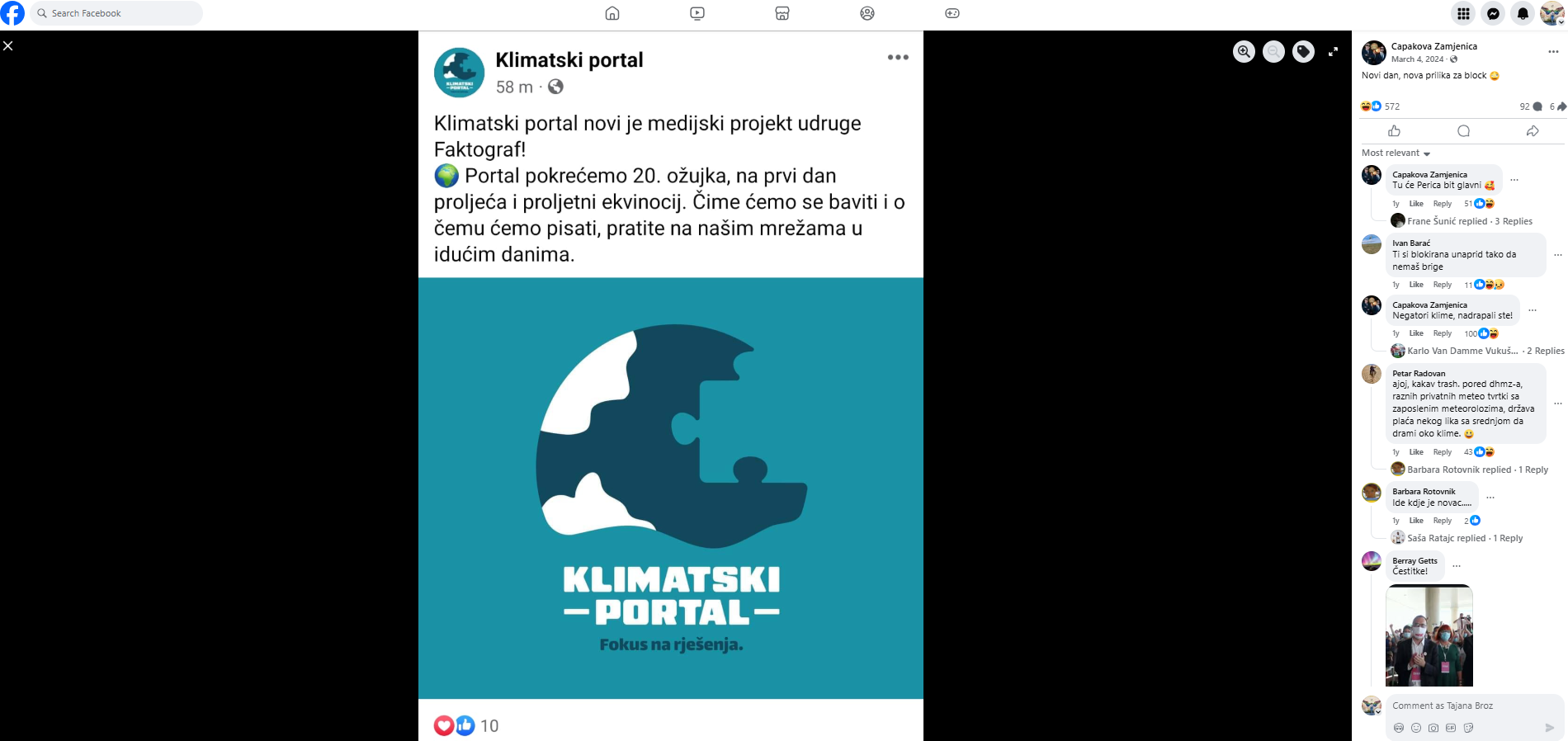
So, already on the first posts on the Facebook page of the Climate Portal, almost half of the reactions refer to Grinning Squinting Faces, who often come from the same group of 20 to 30 profiles.
Two days before the official launch of the Climate Portal, on 18 March, there were over 150 reactions to the Facebook post, two-thirds of which were bots whose profile names gave the impression that they came from Turkey.
Liberal.hr shares a screenshot of the Climate Portal on X with the bots commenting “Faktograf’s Climate portal is massively liked by Turks.” Its Editor-in-Chief Mario Nakić posted the same thing on Facebook. Also, on 20 March, Capakova zamjenica and Nenad Bakić commented on the bots on their Facebook profiles.
Capakova zamjenica commented: “Who’s making fun of Perica’s Climate Portal” with an angry emoji, which garnered 435 reactions, 57 comments, and 3 shares. In the comments, Capakova zamjenica provided a screenshot of the Climate Portal’s imprint and comments that it seems like it will “forever remain in the disgrace of Faktograf.”
Nenad Bakić also commented on the post: “It seems they’re not very intelligent because they say this costs a couple of euros, a scoop of ice cream” and here he presents the idea of stalking editors and journalists, as well as climate activists: “I suggest following Perica and his team of climate activists, as well as other climate activists like Ceci, on posts from unnecessary trips they’re shitting themselves on and making a website about it!”, which he repeated on his Facebook profile a few weeks after.
The screenshot of the bots shared by Capakova zamjenica were shared three hours later by Nenad Bakić on his Facebook profile, along with two other screenshots related to the issue of bots.
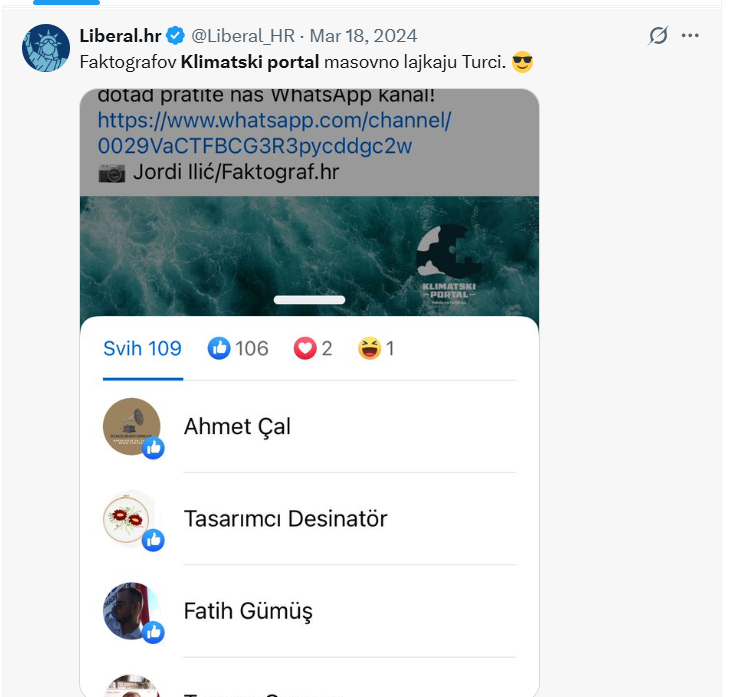
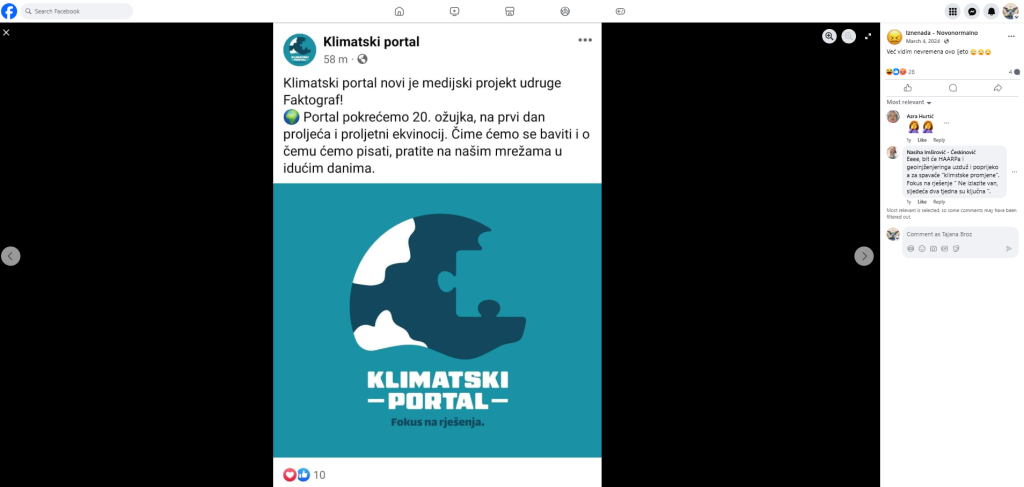
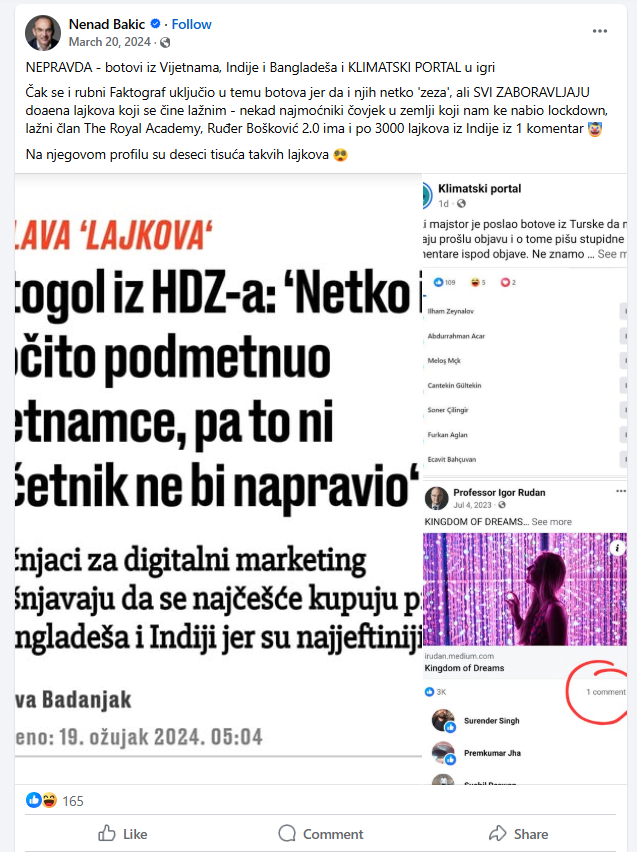
In the following week, after the bot incident, we notice that there is a greater number of Grinning Squinting Faces, which make up more than half of the reactions on almost every post, with an average of about fifty of them. On the posts of 25 and 26 March, there were also several Grinning Squinting Faces from Italian bots. This continues until 29 March, when 124 Grinning Squinting Faces were placed on the post about the temperature increase of 1.5 °C.
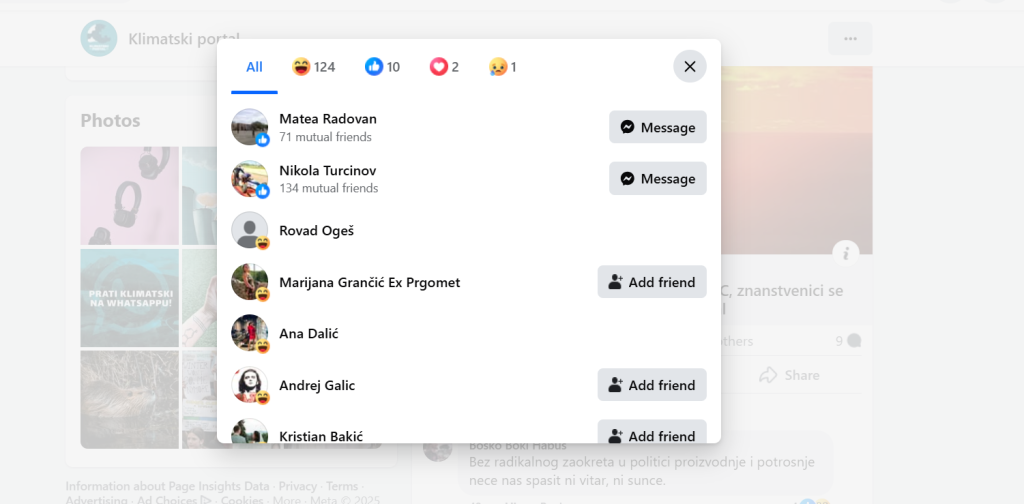
The following posts received an average of 150 Grinning Squinting Faces, while the post on 31 March, titled “Who’s bothered by the Climate Portal?”, received 232 Grinning Squinting Faces. The political party Most was tagged in this post, as the text referred to a video of their MP Marin Miletić.
A day later, on 1 April, the Climate Portal’s post about dzud in Mongolia received as many as 407 Grinning Squinting Faces.
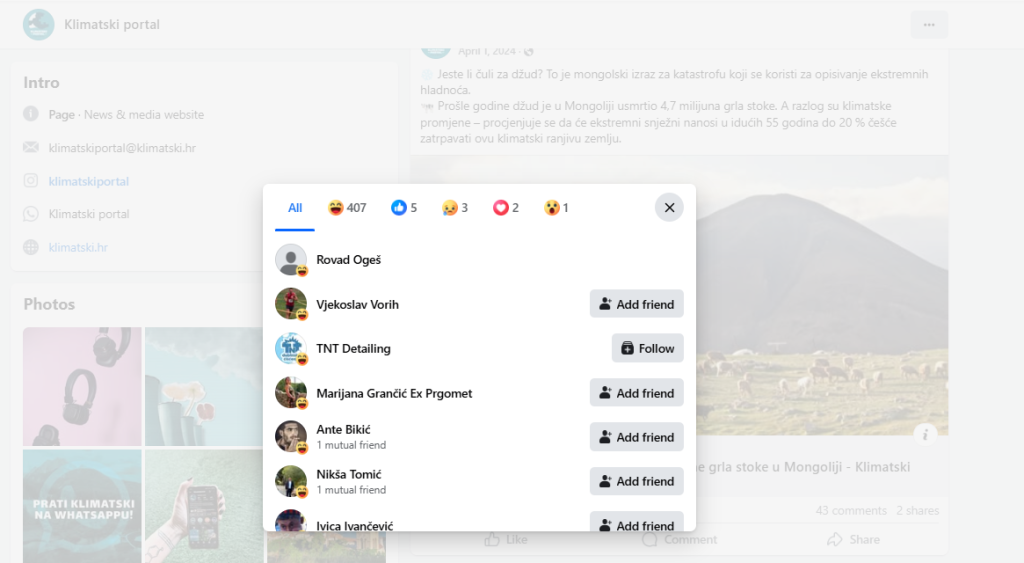
A screenshot of the Grinning Squinting Face on this post was used on his profile by Mario Nakić on 2 April with the comment “That Plenković portal is doing great,” and by Nenad Bakić in a post from 3 April and again on 4 April.
While the bombing with Grinning Squinting Faces continues, Capakova zamjenica posted five more posts in which she satirically mentioned the Climate Portal and comments on Grinning Squinting Faces and the moderation of the portal’s Facebook page, as do numerous commentators on her posts.
For example, on 2 April, Capakova zamjenica published:
“I congratulate Fackograf on Factchecker Day and what do I get?
Block on the climate portal
I didn’t leave a comment or a Grinning Squinting Face.
Beautiful.”
This post received 517 reactions, 110 comments and was shared 4 times. Among others, Nenad Bakić also commented on the post, inviting everyone who has been blocked to report the Climate Portal to the Ministry of Culture and Media.
The situation with Grinning Squinting Faces is also being referenced by Rubni portal, another anonymous Facebook page we encountered during the coronavirus pandemic. Although it doesn’t have a significant follower base like the page Capakova zamjenica, for example, it still has more than 2,300 followers.
In his first post on 3 April, he published a text in which he stated:
“We are honoured to inform you that the editorial team of Rubni portal has managed to break a record of sorts.
Namely, not even 60 seconds passed from the moment we followed Perica’s Climate Portal to the moment we were blocked.
It seems that this is a new practice in the fight against disinformation and hate speech, in the way of blocking someone pre-emptively, even before he has committed a crime.
This is certainly a revolutionary method and is in step with the democratic aspirations of the most advanced democracies in the world, such as Canada’s.
“While we are in a celebratory mood for this inadvertent record-breaking achievement, it remains clouded by the fact that we will no longer be able to share with you the achievements of our most famous checker in the fight against climate and common sense.”
The Rubni portal left its Grinning Squinting Face on the 30 March post.
The fringe portal publishes five more, mostly screenshots related to the Climate Portal, including a “comic” on the subject of Grinning Squinting Face on the Climate Portal.
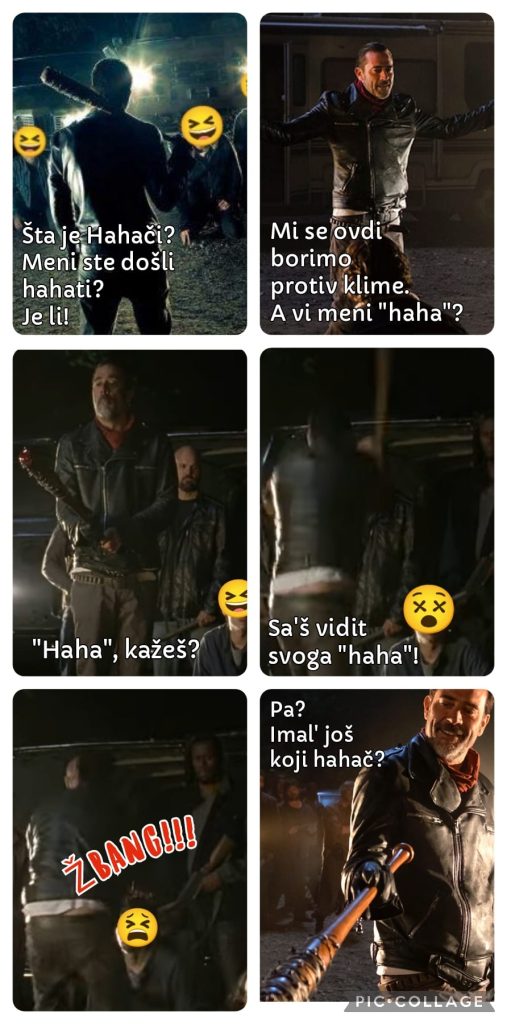
On 4 April, user Djana Ana II posted a video called Grinning Squinting Faces with the description in which she stated, among other things: “CLIMATE PORTAL – LEADER IN THE REGION WITH “Grinning Squinting Faces””, cited data from the imprint and wrote: “And then it becomes perfectly clear to you why every post has more than one so-called “Grinning Squinting Faces”, and the solutions they offer only cause laughter among the wider population. I would be ashamed, but for so-called fact-checkers and mercenaries, shame is covered with a few euros.” This post was published 12 days later by Crodex.net as an article.
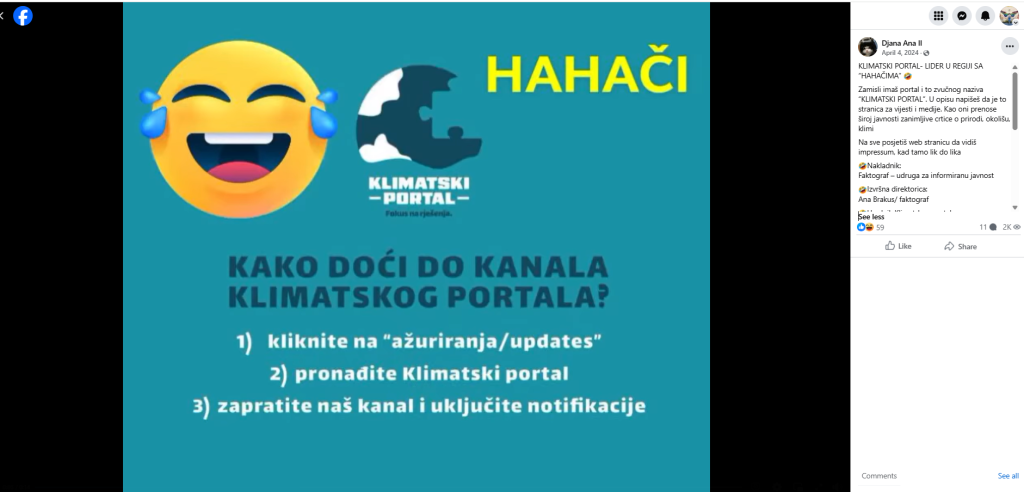
During the period of bombing with Grinning Squinting Faces, on 2 April, we found and preserved a screenshot of the Facebook page Kanonada kapljica, which is no longer publicly available, and which directly refers to “mockery and ridicule” of the Climate Portal. At the time of saving, this post had 53 reactions and 35 comments. In the archive of the Blocked by Bakić page, which collects screenshots from the pages and profiles we are talking about in this case study, it is evident that it was a page that published mainly disinformation content during the pandemic.
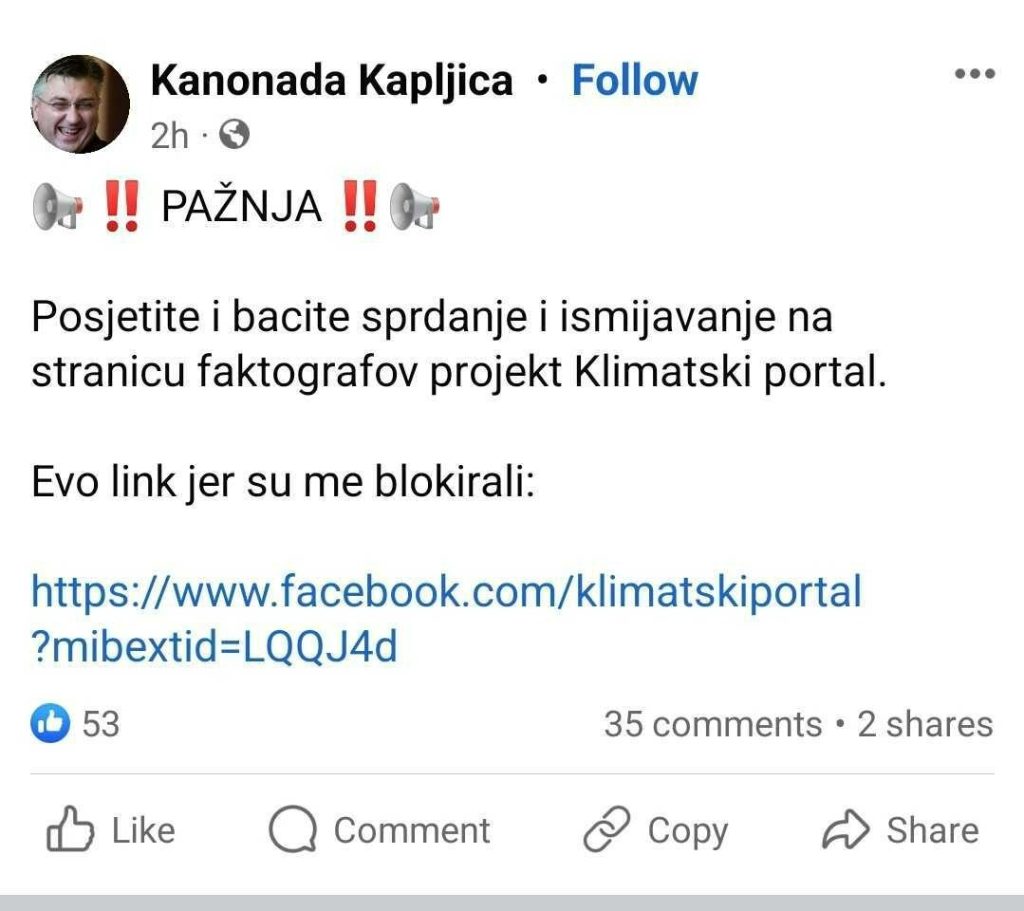
In parallel with leaving Grinning Squinting Faces, some users also leave comments under the posts on the Facebook page of the Climate Portal:
“Losers. Who pays you for these lies?”
“Hahaha.
The climate portal is a new niche for making money for the globalist-satanic clique from the faktograf with the notorious petar vidov at the head of the pack.”
“Yes, and who are they, those who are accumulating profits!? Give me some names, you’re just ranting like this, Perica.”
“You have no shame, Nazis and pedophiles. Your narrative is criminal.”
“Well, let’s be honest, you are the only one spreading disinformation that is not based on real scientific facts, but sponsored by globalist oligarchs with the aim of deceiving the public.”
Some users, on the other hand, leave a photo/meme with the face of the Editor-in-Chief of the Climate Portal in the comments.
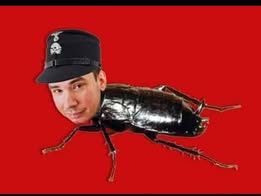
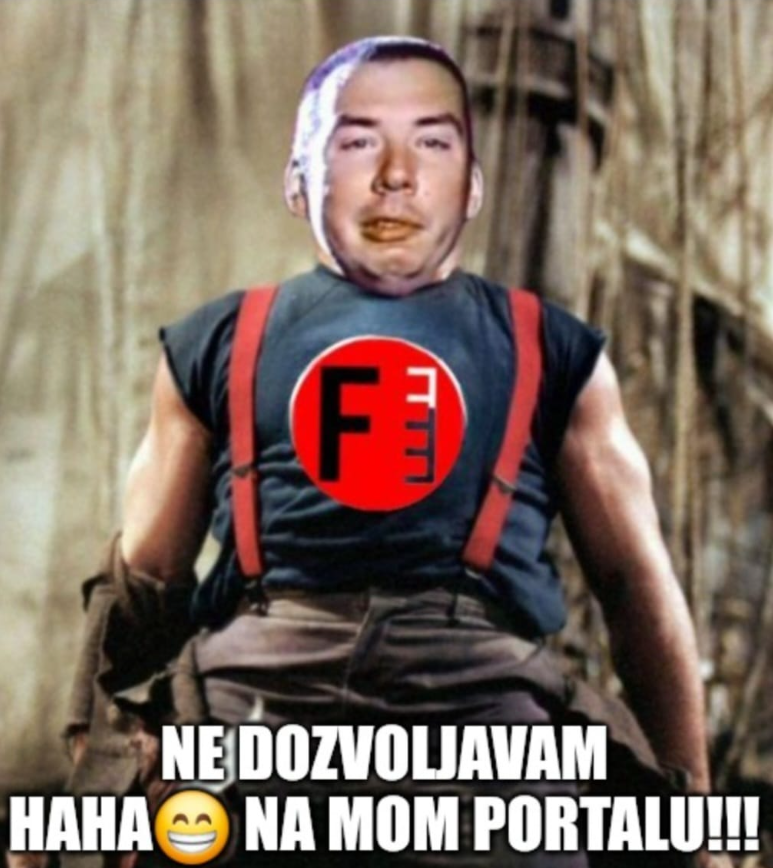
Some of the messages arrive in both emails and social media inboxes, including a message on the private profile of a member of the communications team. For example, one message states:
“Is there anyone who doesn’t make fun of you stinkers?”
“ […] And if you do not correct your behaviour and stop abusing your position, I will directly contact the EU fund from which you received funds and request that they be taken away from you due to conflict of interest, incompetence, unprofessionalism and abuse of power positions where you act as a fact-checker financed by private funds, Facebook and other global power centers.”
Users also gather in other places, such as in the comments of posts on the Capakova zamjenica page, for example, or Nenad Bakić’s profile.
Some users brag about the content of the comments they left under the Climate Portal posts, so one user declares that he gave himself an extra unleash after leaving a Grinning Squinting Face:
“Yoooo! What kind of crap you write, a dog wouldn’t eat it with butter!!
Fuck you, you mercenary cattle! I’m shitting that moron Petar Vidov in his dirty mouth!! Please BLOCK! THANK YOU!”.
Another user also writes that she managed to contact the Climate Portal before the block:
“Climate Portal, you fucking fact-checker…. who are you fooling? And you block everyone who disagrees with your idiotic brainwashing…. get a shovel in your hands and start reforesting when you’re so passionate about the climate and “woke”…”
Some users brag about the speed with which they are blocked:
“Not even a minute after my Grinning Squinting Face I was blocked,” for which he collected 15 positive reactions.
And to what another user replies:
“Same with me!! Fuck their sick mother…!!” and he is rewarded with two Grinning Squinting Faces and three thumbs up.
Further, users wrote:
“They blocked me right after the first joke without me even saying anything.
By God, you scared them well, or what would we say in our country, ‘Whoever has been bitten by a snake is afraid of a lizard’?”
“Welcome to the club of blocked hackers.”
“Yesterday, I just left a comment, and this morning I saw that I was blocked on the Climate Portal. Perica Vidoviti quickly put together a list to shoot. He really embarrassed himself with a few articles, especially the one that got over 150 comments and not a single like.”
“I managed to leave 4 Grinning Squinting Faces”
“I lasted 3 minutes until the block… but I managed to address them.”
“Luckily, yesterday I went to check if the Facebook page of the so-called Climate Portal would block me if I went through the posts and commented or posted a Grinning Squinting Face. And with incredible speed – when I commented on the third post – the page became inaccessible to me = they blocked me in the blink of an eye. There you go. They seem to have a lot of work all day, because they need to block all the people who laugh at their posts.”
“I didn’t get to use the bully smiley aka. I started right away as soon as they started with love and decency and asked them under the post to give me links to studies, scientists and facts based on which they wrote the post and immediately insta block. They don’t want to share anything in brotherly love”
“Here I am, dear heroes. They blocked me on the Loony Portal in a second”
“I just put 3 and I flew into the block. There’s no joking around with science.”
“Same for me, it took them about a minute”
Others threaten:
“Before all these political vermin, this journo-FRAUD gang should be punished in the most brutal way possible.”
This increased number of Grinning Squinting Faces on the posts of the Climate Portal’s Facebook page lasts until approximately 7 April, after which their number begins to decrease, which is a consequence of the content moderation policy that is beginning to produce results.
A total of 3,782 Grinning Squinting Faces were placed on 54 posts on the Climate Portal Facebook page. According to the Climate Portal’s communications team, around 1,500 different Facebook profiles participated in the campaign of trolling, insulting and threatening the newsroom via the Climate Portal Facebook page. Analysis of a sample of these profiles indicates several characteristics. Some of the user profiles participating in the campaign are anonymised user profiles, meaning that they clearly have fake names and it is not possible to know who the people are behind these profiles. Some of the users have a significantly small number of followers or friends and it is obvious that they are used as profiles for propaganda activities online. We see a significant amount of disinformation content on some of the user profiles, and they often share the content of the profiles and pages mentioned in this case study. Some of the profiles are completely private and it is not possible to determine their characteristics.
Operation: Emails
On 3 April at 6:27 am, Nenad Bakić posted a call to all those who are blocked on the Climate Portal page to write to the Ministry of Culture and Media, stating that “it is important that all those who are blocked because of jokes report them to the ministry, because by blocking people who give feedback and whom they don’t like, they are trying to make themselves better and thus probably get better grades in the ministry – and such manipulation means manipulation of our (public) funding!”
Hana Matić, also the Vice President of the Save Small Family Tourist Accommodation Owners Association, responded to this post while inviting people to send emails on almost all detected pages, stating: “I was also blocked after 2 Grinning Squinting Faces. I didn’t know they were funded by the state. I will definitely send an email to the Ministry of Culture because we must fight this cancel culture in every way possible. We saw in the pandemic what it brings us, and that’s why everyone should send an email and not be lazy to do it. Thanks for the advice.”
Further in the comments, Hana Matić explains to one of the users: “They are not working against themselves, but for themselves. Tomorrow they will say that people have accepted them well and that they agree with their posts. You get the idea? That’s why we need to write an email complaint to the Ministry of Culture, which finances them with our money. [email protected],” and Nenad Bakić continues: “people should write.”
Hana Matić commented on Nenad Bakić’s next post: “I just wrote an email to the Ministry of Culture in which I oppose further funding of the climate portal, given that it blocks people for any disagreement, which means that it is denying me, as a taxpayer, information even though it is financed with taxpayer money.
I expect an answer from them on what they will do in the future to stop such totalitarian behavior. I suggest everyone write two or three words to the Ministry.” To which she received 29 positive reactions and praise from Nenad Bakić, with encouragement for others as well.
In the comments of the post in the group Osviješteni građani, Hana Matić gave thanks for the praise for the initiated action, but attributed the credit for the action to Nenad Bakić.
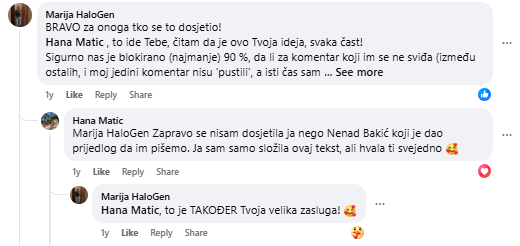
In the public Facebook group Osviješteni građani, which has more than 21,000 members, and whose administrators are the leaders of the association “Osviješteni”, the Vice President of the association Nenad Šiprak, who is also an author on the portal Epoha.com.hr, on 3 April published a screenshot with 286 Grinning Squinting Faces on the Climate Portal with a sarcastic comment:
“Congratulations to Climate Portal as one of the funniest pages on this platform! Judging by the emoticons, you are doing very well! Keep it up!”
In the comments on this post, Hana Matić once again called for an email campaign to the Ministry of Culture and Media and the Agency for Electronic Media:
“I invite all the people who were blocked, and that is absolutely EVERYONE who expressed their disagreement with the text through a comment or an emoticon, to write an email to the Ministry of Culture in which they will complain about such treatment and discrimination, considering that the Climate Portal is financed with OUR MONEY from the state budget.
I sent them an email.
If we don’t object, in six months they will say that they were “excellently received” by the citizens and that they justified their purpose. And they will get new money.
So write a quick email:
And to the agency for electronic media:
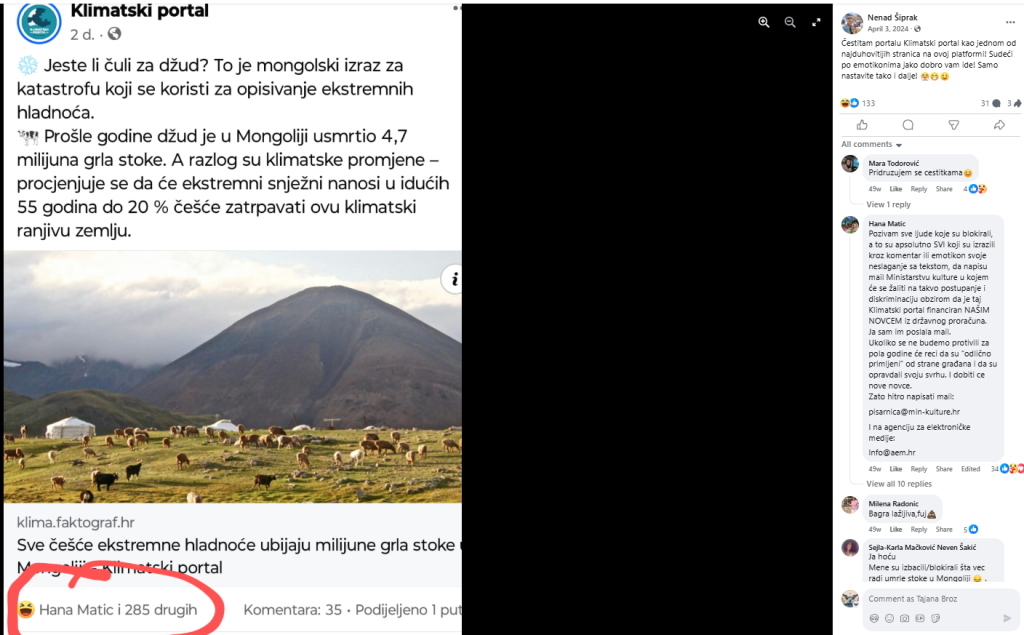
This same invitation was later published in the group by Nenad Šiprak as a separate post. The post garnered 55 positive reactions, 22 comments, and 4 shares.
In the comments of the aforementioned post, Hana Matić provides a template of her email for others to use:
“Dear Sir,
In recent days, the “Climate portal” has started operating, which I hear is financed by your ministry, i.e. from the state budget.
If that portal is intended to inform citizens (and it should be), then it is unacceptable for that same portal on Facebook to block citizens who express any disagreement with the topic in the article.
I am personally a victim of their blocking and I believe that as a taxpayer I am being deprived of information.
Such phenomena should not happen if someone (in this case, that portal) is funded with public money.
I oppose further funding of such arbitrary behavior with public money.
I kindly ask for your response and what you will do regarding this phenomenon, which has the characteristics of a totalitarian behavior.”
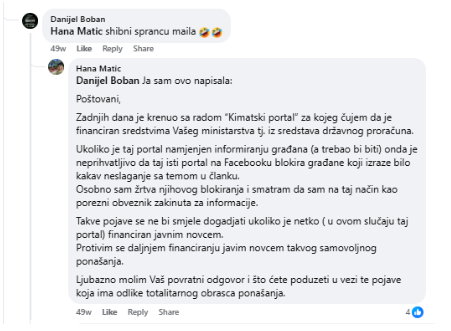
Hana Matić also commented on the Rubni portal post about sending emails to the Ministry of Culture and Media. Several other users also wrote about sending emails, and in several places in the comments, on different pages, we find a screenshot of the Ministry of Culture and Media’s response, which she refers to addressing the Agency for Electronic Media.
One of the users wrote about how she will send a report to the Ministry of Culture and Media in the comments on the Climate Portal Facebook page on the morning of 3 April: “Just to let you know that the Ministry of Culture will receive a criminal report next week because you are blocking people who fund you because of the most ordinary jokes. Good luck, you bums!”
According to information provided to us for this case study by the Ministry of Culture and Media, one complaint about the Climate Portal was received at the ministry’s email address, which was forwarded to the Agency for Electronic Media for action.
Robert Tomljenović, Deputy President of the Council for Electronic Media, states that the Agency for Electronic Media (AEM) registered a total of 9 complaints against the Climate Portal during April and May 2024.
“The content of the complaints mostly related to social media, namely the dissatisfaction of the citizens concerned with the fact that the Climate Portal had prevented them from commenting on its social media channels, claiming that this was censorship and preventing freedom of speech. AEM rejected all these complaints in its responses, stating that the Climate Portal fully complies with the rules of the relevant NPOO competition, that it does not in any way threaten freedom of expression and that it does not practice censorship. AEM referred all those who complained to the Climate Portal website with a recommendation to inform themselves about climate change there,” Tomljenović stated.
Additionally, the Agency for Electronic Media also noticed that this was an action by connected actors. “We noticed that these complaints were made using a slang term and that they were “forwards”, because the complaints were almost identical, mostly written in the feminine gender, and some concerned male citizens also wrote to us in the feminine gender,” said Tomljenović.
Ultimately, the Council for Electronic Media included the complaints received “for blocking and deleting user comments on the Facebook page of the electronic publication klima.faktograf.hr” at its 16th session, which was held on 11 April. As can be seen from the minutes of the aforementioned session, the Council for Electronic Media determined that “the Agency is not competent to act when it comes to social media.”
The significantly small number of complaints sent by email may have several possible explanations. The first explanation is that it is difficult to encourage citizens to turn something that seems like harmless internet fun and trolling into more concrete action. Furthermore, anonymous profiles also took part in the trolling, and it is logical to assume that the individuals behind these user profiles do not want to expose themselves to state and public authorities. And for some users, it was obviously enough to leave insulting and threatening messages to the Climate Portal’s newsroom to satisfy their need for “action”. And finally, there is a possibility that the same person is behind a large number of anonymous user profiles or that part of the user profiles who left Grinning Squinting Faces are actually bots (but proving such inauthentic coordinated behaviour was not the subject of this analysis).
Building a narrative
The bombing with Grinning Squinting Faces was accompanied by the construction of a narrative around the Climate Portal by fringe media and political and other influential actors.
On 17 March, Narod.hr published an article: Faktograf Discovers New Business Niche: With the Help of the State, It Controls What is Written About the Climate, in which it states a number of inaccuracies: “The Faktograf Association, specialized in controlling the flow of information in the public space, has recently launched a portal specialized in providing information about the climate, in addition to a corresponding website…. Faktograf has become known as a site that monitors, denounces, and censors information published on social media. If Facebook users post something that Faktograf deems to be wrong, Facebook can delete that post or even block it….Faktograf generously uses state funding sources for its work, and this is also the case with the new climate portal.”
On 23 March, Liberal.hr published an article by its Editor-in-Chief Mario Nakić titled “Plenković’s government has poured 199,000 of your euros into a portal that no one cares about.” It is most likely no coincidence that the article is accompanied by a photo of Prime Minister Andrej Plenković wearing a medical mask as a symbol of the pandemic. In his text, Nakić presents several key narratives that will continue to be perpetuated through the public.
The first narrative refers to public financing and “throwing huge amounts of taxpayers money down the drain.” The second is that Faktograf and Petar Vidov are “biased and ideologically immensely extreme” and that they will write about the climate crisis from the position of “climate ideology”. The third narrative is about how public policies related to the climate crisis are harmful and it states: “I assume that Plenković thought it was an “investment”, that such a biased climate portal would help him to more easily sensitize the public to the “green” policies that he plans to introduce in Croatia, and he knows that there will be resistance because people are not crazy enough to return to the poverty that people lived in in this region 100 years ago.”
In the context of the first two narratives, Nakić states that he “doesn’t mind Faktograf’s climate portal either. It’s all part of pluralism and all opinions are welcome, even extreme ones. But it makes absolutely no sense for the state to finance such ideological-extremist projects.”
In the same article, published three days after the public announcement of the Climate Portal, Nakić states that “Faktograf’s “Climate Portal” does not attract much public attention, and certainly not approval of their narrative. Among all the posts on Facebook, only one has attracted several hundred likes – and those likes are mostly from Turkey. They have a total of 351 followers, the vast majority of whom do not exist at all. They receive 5 to 10 reactions per post, mostly “Grinning Squinting Faces”. People mock them.”
The article is also published on Liberal.hr’s Facebook page, where it collected 85 thumbs-up reactions, 4 comments and 3 shares.
Nakić’s article was reposted by the association Slobodni zajedno, which emerged from an initiative gathered around opposition to measures to suppress the coronavirus pandemic, and the public group Osviješteni građani.
Nakić’s article is also referenced by Most’s MP Marin Miletić, who on 24 March posted a video on his X and Instagram profile in which he says:
“Mario Nakić writes about how Andrej Plenković invested 200,000 euros in a famous climate change portal, giving it to Petar Vidov, a well-known promoter of censorship and the suppression of freedoms and civil rights during the pandemic… He gave this character 200 thousand euros to spread lies and nonsense about climate change, which has been happening since the beginning of the world, but they are only blowing the horn of a bunch of green politicians, who are only there to turn over billions and billions of euros. We will shut down all these associations, we will not give them a single penny when we take responsibility for leading Croatia, but we will direct those 200 thousand euros into reforestation. […] It is much wiser to direct the money there and thus protect the planet, than to give money to these characters, puppets ultimately in the hands of the powerful.”
These two posts have garnered just over 460 reactions, and more than 1,460 views on X.
The Editor-in-Chief of the Climate Portal writes a response to these claims in the text “Who’s bothered with the Climate Portal?”, in which he exposes the listed inaccuracies, starting from the nature of the allocated funds to the nature of possible solutions for the climate crisis seen by the relevant institutions, which are in direct opposition to certain political ideologies.
Nenad Bakić joins the narrative building on 3 April with several posts on his Facebook profile, and as we have already mentioned, he encourages his followers to send emails to the Ministry of Culture and Media.
In his first announcement, he calls the Climate Portal a “clown portal” and “one of the most shameful projects in the Republic of Croatia” and at the same time calls on “everyone who was blocked because of jokes to report them to the ministry, because by blocking people who give their feedback and whom they don’t like, they are trying to make themselves better and thus probably get better grades in the ministry – and such manipulation means manipulation of our (public) funding!” This announcement collected 616 reactions, 91 comments and 16 shares.
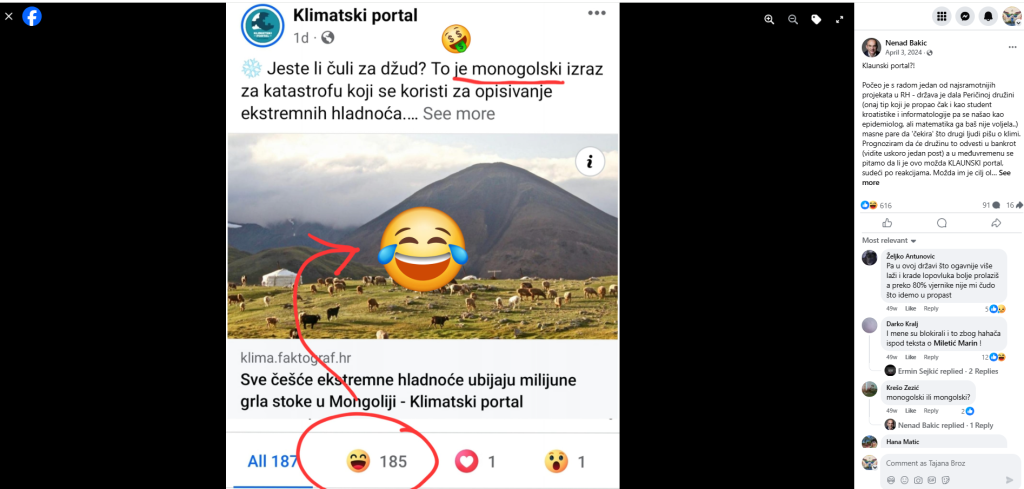
In another post, he writes in more detail about his assessment of Faktograf’s work during the pandemic and states that the funds for the Climate Portal are “probably some kind of rotten compromise regarding some EU funds (long story), so ‘to give a little to the leftists’. A serious mistake by the HDZ.” In the comments on this post, several users write that they sent a complaint to the Ministry of Culture and Media because they were blocked, to which Bakić replied: “that’s great, everyone who are blocked should do that.”
Liberal.hr also wrote about it on X stating that “the government of the Republic of Croatia (this HDZ government) through the Agency for Electronic Media, gave the Faktograf association money for a climate portal, where proven climate extremists who now make a living by blocking taxpayers – the people who finance them – because of disagreement.” The post collected 41 reactions and has more than 1,200 views.
A day later, on 4 April, Nenad Bakić announced that the Climate Portal had “broken Facebook’s record for mockery,” noting that the number of Grinning Squinting Faces on one of the posts had reached 325. His post garnered 498 reactions, 54 comments, and 8 shares.
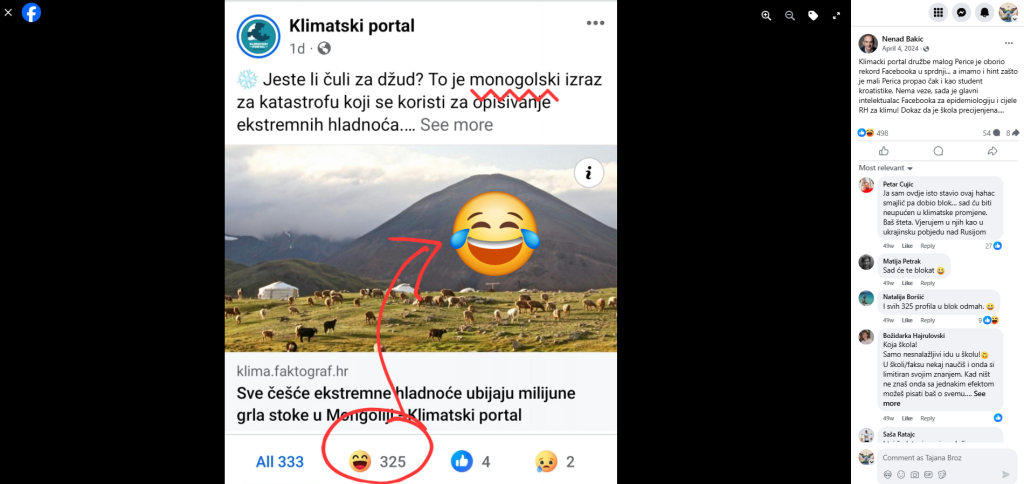
On the same day, Mario Nakić published a new text on the Liberal.hr portal, in response to the text of the Editor-in-Chief of the Climate portal, in which he repeats narratives related to ideological bias in the form of left-wing and Marxist activism, how politicians actually distribute money without the people’s wishes and treat taxpayers as peasants, and additionally accuses for inquisition:
“Anyone who reminds us of the fact that climate change has been happening since the beginning of the Earth and will continue to happen as long as it exists, Vidov accuses of “denying” climate change. This syntagm, which is quite religious, actually shows what kind of extremist he is. If you are not in accordance with religious dogma – even when you state absolute facts – religious extremists will accuse you of infidelity, perjury or blasphemy. And that is the most serious sin against God, for that follows Inquisition. Those who questioned their dogmas were burned at the stake. Today, they try to silence them on social networks and completely kill them with various labels – such as “anti-vaxxer”, “climate change denier” and the like.”
On the Liberal.hr’s Facebook page, a post with a link to this text has garnered 134 thumbs up reactions, 9 comments, and 3 shares. One of the comments with the most positive reactions states: “After reading this text, I went to the climate portal and started making jokes – after the third joke, the portal disappeared.”
The website Crodex.net, also known for spreading disinformation and conspiracy theories, without it being possible to determine who is owner of the website, reposts Miletić’s and Bakić’s Facebook posts through the articles: Miletić about the 200,000 euros that Plenković is throwing at Faktograf’s “climate change portal” and Petar Vidov’s clown portal that we are paying for?!
In his recognisable style, continuously used during the coronavirus pandemic, Nenad Bakić, in a post from 5 April, calls on his followers to further devise a plan to harass climate activists and journalists, all for the purpose of allegedly exposing hypocrisy:
“Idea for a project related to climate change
A website / social network that will publish public photos and other data of climate influencers, fact-checkers and other ‘climate-worried’ people (and possibly just parasites on that topic), which show that they themselves care about the climate. I think that anyone who bullies others about the climate needs to start with themselves – for example, not traveling to dinosaur concerts (by car or plane), turning on the air conditioners or going to conferences physically.
It is important to use public photos and other documents – parasites often like to take pictures – so that there is no doxing or ‘intrusion into intimacy’. However, if some depopularizer posts a public nude photo from the bathroom, that is OK.
It would be cool, for example, to see if a climate fact-checker traveled by plane or car to a conference abroad or to go skiing (artificial snow! transportation! equipment production!).
In the next stage, the carbon footprint is calculated. For example, if a climate activist weighing 150 kg flies to a concert, the footprint is calculated proportionally to the weight, etc.
I would be really interested in exposing false climate prophets to bring out the real ones, so if you have a good idea and a good reason why you will succeed, I can help with funding.”
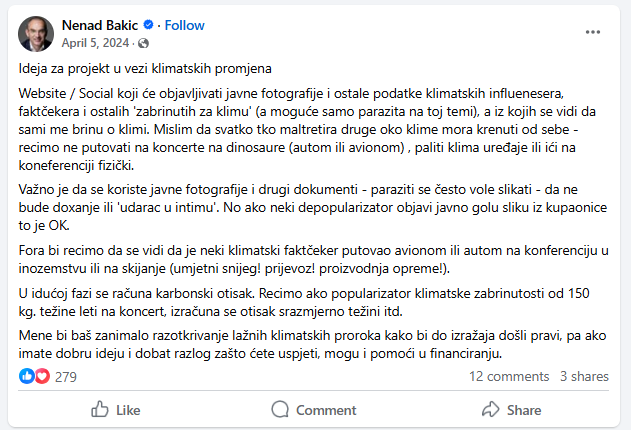
On the same day, he also conducted a survey asking his followers:
“What do you think are the most morally degrading professions:
– ‘fact checker’
– a scientist who became a covert propagandist for the farm pushing unnecessary or harmful interventions
– something else?”
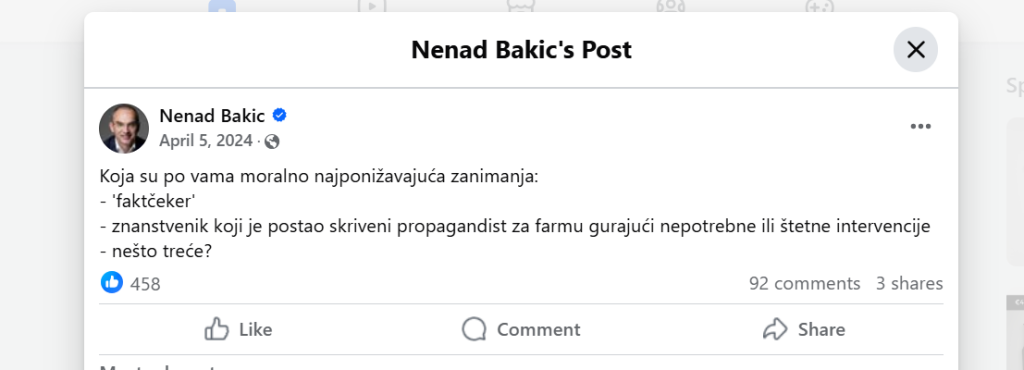
Almost all the aforementioned actors will sporadically mention the Climate Portal and its Editor-in-Chief Petar Vidov in the coming period, but they will no longer produce significant actions against the Climate Portal.
Narratives
The narratives that were used in the attack on the Climate Portal were largely taken from the disinformation campaign that was carried out against Faktograf during the coronavirus pandemic or that we have already detected as being used against the media, with the upgrading to narratives related to climate and climate change.
We can divide them into three types of narratives – the narrative about fact-checking as ideologically biased censorship, the financial narrative, and the narrative about climate science as unreliable, which is very common when talking about climate change.
A narrative about fact-checking as ideologically biased censorship
This disinformation narrative was developed during the coronavirus pandemic by extremist, mainly right-wing political groups, anti-vaxxers and conspiracy theorists, and is primarily based on disinformation related to the implementation of Meta’s Third Party Fact-Checking programme, which then spread to all specialised fact-checking media, whether they participated in that programme or not. It should be noted here that the Climate Portal is not part of Meta’s programme, but is exclusively Faktograf.hr.
And while fact-checkers around the world have been persistently explaining how the programme works for the last five years and how fact-checkers do not have the ability to decide how Facebook’s algorithms are programmed and when they remove certain content, Meta itself took the side of disinformation actors after the victory of Donald Trump in the US elections. With this twist, the company decided to support this narrative and exposed fact-checking organisations to additional attacks, despite the fact that the narrative about censorship has no basis in reality.
On 7 January, 2025, Mark Zuckerberg published a video in which, among other things, he declared that the programme in the US led to censorship and that the fact-checkers were politically biased.
At this point, it is necessary to repeat everything that the international fact-checking community said in its open letter on Meta’s decision, and what it repeated throughout the duration of the programme:
- Meta has required all fact-checking partners to meet strict standards of impartiality, certified by the International Fact-Checking Network (IFCN). This meant no affiliation with political parties or candidates, no advocacy of policies, and implied an unwavering commitment to objectivity and transparency. Each media organisation undergoes a rigorous annual review, including independent assessments and peer reviews. Meta has consistently praised these standards for their rigor and effectiveness. Just a year earlier, Meta extended its Third Party Fact-Checking programme to Threads.
- Meta has never given fact-checkers the ability or authority to remove content or user accounts. Social media users have often blamed and harassed fact-checkers for Meta’s actions.
- Meta decided how content that fact-checkers deemed inaccurate would be ranked or flagged. Several fact-checkers have suggested to Meta over the years ways to improve the flagging to make it less intrusive and to avoid even the alleged appearance of censorship, but Meta has never acted on these suggestions.
- Meta exempted politicians and political candidates from fact-checking, even when they were spreading lies.
- Meta has provided limited information about the programme’s results, despite repeated requests from fact-checkers and independent researchers for more information. However, independent research has shown that fact-checking labels have reduced belief in and sharing of false information, and Meta itself has repeatedly boasted about the programme’s results, stating: “We know that this program works and that people find the warning labels we apply to content after it has been reviewed by our fact-checking partner helpful.”
We can also explain once again what the word censorship means – it means banning speech, and it doesn’t mean providing additional information or reducing the reach of content. Even Elon Musk, celebrated among the actors of this case study, said in 2022 what Meta de facto did: “New Twitter policy is freedom of speech, but not freedom of reach,” or in translation, freedom of speech is not freedom of reach.
Let’s repeat once again, within Meta’s fact-checking programme, the fact-checkers added accurate information or context to the posts and did not make decisions about visibility or reach policies on Facebook. This was done exclusively by Meta, no matter how much they now pretend, in order to be at the mercy of the new US administration, that they were not the ones who decided what the programme would look like and what consequences it might have for users.
As for ideological bias, a number of studies have shown that groups close to the radical right are more inclined to present conspiracy theories, unproven, inaccurate or non-contextualized information than some other groups, and that it is logical that in quantitative terms, there is a slightly higher number of fact-checks on that side of the political spectrum. However, the politicians were excluded from Meta’s programme all the time, and their posts did not show any fact-checking labels.
All this has been said a thousand times, but it has proven to be one of the most effective and ingrained disinformation narratives, but also a tool of the extreme right for sowing distrust in the media, and the very concept of fact-checking – which is basically the foundation of all journalistic work – has become synonymous for censorship. At the same time, the same actors who shout “Censors” are actually restricting freedom of speech and expression, including academic freedom, as we are currently seeing in the USA.
Financial narrative
Financial narratives have appeared in the attack on Faktograf before, but while previously it was about claims that Faktograf and its newsroom were “foreign mercenaries”, that is, that Faktograf was financed by global powers and states like the USA, in the case of the Climate Portal, it is about financing with grants from European funds allocated by Croatian state institutions, which then changed the basic narrative.
As we already wrote in the case study “Attacks on Croatian weekly Novosti: “Light ‘em up or shut ‘em down””, in the case of public sources of funding for the media, the narratives are shaped somewhat differently, although in essence they remain the same – the one who receives funds outside of the market supposedly works for the interests of the one who gives those funds.
In this case, the underlying narrative is that Faktograf, or rather its Climate Portal, is a media outlet of Prime Minister Andrej Plenković. It is worth mentioning the paradox that often arises in this type of argumentation. Namely, Andrej Plenković is the President of a centre-right party and is already in his third term leading a government that positions itself as a centre-right government, while Faktograf is in parallel continuously accused of belonging to the ideological left and even of Marxism. And while some individuals try to get out of this mind twist by using conspiracy theories about hidden higher interests (Nakić, Bakić), others will simply put everyone in the same conspiracy basket of “global elites” among whom there is no real difference anyway (Miletić).
Financial narratives related to the media typically include the claim that the media should not depend on state funding and should not “waste taxpayers money”, but should survive on the market.
At the same time, this narrative also suggests that, when something is financed with public funds, then these media outlets should write in the interest of the people – with those who say so assuming the right to formulate that interest. Additionally, the email campaign emphasised the view that, if something is financed with public funds, then citizens and social media users are allowed to do anything, including trolling, insulting and threatening those who receive public money.
The “Climate science is unreliable” narrative
Within the framework of the project “Facts about the climate crisis” through which the Climate Portal was launched, an analysis of the climate disinformation that Faktograf.hr exposed during its work was made. For the purposes of this analysis, the CARDS taxonomy was used as presented in the paper “Computer-assisted classification of contrarian claims about climate change”, written by Travis G. Coan, Constantine Boussalis, John Cook & Mirjam O. Nanko, published on 16 September 2021 in Science Reports 11 .
That taxonomy lists five key climate disinformation narratives:
- Global warming is not happening
- Human Greenhouse Gases are not causing global warming
- Climate impacts are not bad
- Climate solutions won’t work
- Climate movement/science is unreliable
As stated in the analysis “Manufacturing Doubt and Persecuting Science”, the disinformation climate narrative “Climate Science is Unreliable” includes claims that there is no scientific consensus on climate change and claims that climate science is corrupt and biased. It also includes conspiracy theories that science is being used to falsify data to falsely demonstrate that climate change exists and/or that science, with the help of advanced technology, is producing extreme weather events to create the illusion of climate change. It is claimed that powerful elites who want to control the world are behind this. This disinformation narrative also includes claims that are engaged in defamation of various actors specialised in the issue of climate change, such as international institutions, the media, activists and politicians. One of the common tactics of defamation is to highlight their alleged hypocrisy if, for example, they use air transport for travel, which we had the opportunity to see in the example presented in this case study.
We saw almost all the elements of this narrative in the case of the attack on the Climate Portal, and it was perhaps best summed up by Nenad Bakić in his survey in which he asked his followers who they trust less – fact-checkers or scientists.
As also determined in the analysis, there is a significant overlap between actors who spread disinformation during the coronavirus pandemic and those who now express some form of climate change denial or use disinformation narratives about climate change. The common basis of disinformation narratives related to the pandemic and climate change is the alleged deprivation of citizens’ liberties for the sake of policies to combat the pandemic, i.e. climate change, and the change of “our way of life”. We can illustrate this with theses that say: during the pandemic, they locked us in our houses so we wouldn’t get infected, now they will lock us in 15-minute cities to save the climate; before they made us wear masks, now they will make us eat insects.
What we additionally notice is that the view that climate change is a real and urgent problem is starting to be called “green ideology” and is starting to be associated with the so-called gender ideology and the great replacement conspiracy theory, turning into a unifying “Woke” conspiracy theory – a dystopian vision according to which European and Western elites and major political parties, with the support of scientists and the media, will confine the population within 15-minute cities, take away their cars, force them to ride bicycles, influence children to change gender, force people to eat insects, allow dark-skinned men to rape white women and, in general, they seek to destroy Christian culture, the traditional heterosexual family and “our way of life” based on fossil fuels.
Post festum
After April 2024, the attacks decreased, but the actors mentioned in this case study took even the slightest reason to spread disinformation narratives and attacks on Faktograf, and now the Climate Portal. Some political actors continued to use the implementation of the measure “Establishment of a system for verifying the accuracy of information” to address the Ministry of Culture and Media and the Government of the Republic of Croatia, spreading the narrative of fact-checking as censorship and often of Faktograf as a symbol of that censorship.
One of the actors of this case study, the Editor-in-Chief of the Liberal.hr portal Mario Nakić, after the parliamentary elections in May 2024, repeated speculations about the connection between Andrej Plenković, the European Union and Faktograf via his personal profile and the Liberal.hr portal page. He went so far as to claim that the Minister of Culture and Media, Nina Obuljen Koržinek, would remain a minister in the new government of Prime Minister Plenković only because “Faktograf is financed through that ministry”:
“I think the only thing that matters to Plenković is to keep the Ministry of Culture because he finances Faktograf through that ministry. Nina Obuljen Kožinek, who won fewer votes than Ava Karabatić in the elections, must remain a minister. I still can’t figure out why Plenković is scratching his head to preserve the public funding of the communists, maybe someone in Brussels is holding him in check or they have given him something big. Or maybe it’s theirs at heart. Well, I really don’t know the reasons, but what is happening, what we see, what is public, shows that I was right all along. There is a nasty and rotten symbiosis between Plenković and the journalist mafia.”
In the comments, he claims that by launching the Climate Portal, Faktograf is only carrying out Plenković’s will, and he responds to the comment that Faktograf criticises the government, so his theory is not a particularly logical one:
“In “peacetime” time – yes. And that’s how they help him, actually. But when a crisis comes and people screw up, look at how the media behaves.” One of the users of the X network comments: “The payments for climate propaganda started right through the Ministry of Culture. Which means that the payments for corona and vax propaganda probably went the same way. Such an important agency cannot just be left to someone unsuitable.”
He shared a post on the same topic the next day:
“What did I say about the Ministry of Culture, aka the ATM of the left? It’s the most important department for him and his Nina has to be there. Even if 10 more reports are filed against her, and she didn’t win a single vote in the elections. Bombs can fall, the country can open up, Nina has to be there so that Faktograf gets its money. And that’s it!”
Nenad Bakić also continues to write periodically about both Faktograf and the Climate Portal. For example, in November, he published a screenshot of the text “Donald Trump is a climate catastrophe” along with a photo of the Editor-in-Chief with the comment: “Are you aware that the state pays a failed Croatian studies student but an expert in epidemiology and climate to publish such things on ‘their’ (i.e. ours – financed with our money) ‘portal’?”
As we have already stated in the chapter on narratives, Mark Zuckerberg’s announcement about the termination of Meta’s fact-checking programme in the USA caused the repetition of disinformation narratives about fact-checking and then, as a result, attacks on Faktograf and the Climate Portal.
In the weeks after 7 January, Faktograf recorded texts on almost all the portals mentioned in this case study – Narod.hr , Liberal.hr , Logično.com and Crodex.net , which once again repeat disinformation narratives about fact-checking, this time with the arguments of the company that launched the programme and manages it.
Nor did other actors such as Nenad Bakić, Mario Nakić , Capakova zamjenica and Rubni portal fail to refer to the cancellation of Meta’s fact-checking programme in the US, after which Faktograf.hr and the Climate Portal received a series of messages (in comments on social networks and in inboxes) containing hate speech, insults and threats.
The Ministry of Culture and Media also made a statement about the cancellation of Meta’s fact-checking programme in the US, noting that “the cancellation of the fact-checking program itself could cause even greater damage to society by the removal of restrictions on many forms of speech that Meta has so far considered harmful, and this could consequently open the door to harassment, bullying and other harmful speech on Meta’s platforms.”
In response to the Ministry, Most issued a statement in which he points out: “It is scandalous that the line ministry de facto advocates censorship and provides unconditional support to the notorious Faktograf, which was clearly shown to have limited its reach exclusively to political dissidents. This includes those who today oppose the woke agenda, illegal migration and the uncontrolled import of foreign labor, as well as those who yesterday fought against unanimity during the coronavirus pandemic. Among those who Faktograf limited the reach and against whom he paid for ads on social networks and we, as a political party.” And again ignoring the fact that politicians and political parties are excluded from Meta’s fact-checking programme, so their reach on the platform could not have anything to do with Meta’s fact-checking programme.
The debate did not go unnoticed in the Croatian Parliament. Most’s MP Nikola Grmoja asked Prime Minister Andrej Plenković on 16 January about his opinion on Meta’s abolition of fact-checking, in which he reiterates that Faktograf censored dissenters and calls Faktograf the Ministry of Truth. Andrej Plenković said in his response that the measure implemented by the Ministry of Culture and Media is good because it has encouraged the launch of more fact-checking media.
In regard to the narrative of alleged censorship promoted through the implementation of the measure “Establishment of a system for verifying the accuracy of information”, Robert Tomljenović from the Council for Electronic Media comments as follows: “We consider this narrative to be completely unfounded, that is, the spread of this narrative is about the spread of disinformation and very often the misuse of the term freedom of expression, which is used in a wrong and manipulative context. In the project “Establishment of a system for verifying the accuracy of information”, financed as part of the NPOO measure, there is no censorship whatsoever, in fact, the idea of the project is the decentralization, not the centralization, of the information verification system and the encouragement of the creation of a larger number of hubs for detecting fake news, disinformation and misinformation. In short, the project encourages the democratization of the information verification system. In the project, we connected the scientific community, the civil sector and the media, thus establishing the foundation for ensuring competence, professional basis and credible verification of the accuracy of information. And the fact that specialized thematic fact-checkers within the project completely independently conduct verification of the accuracy of information speaks of this complete democratization of the information verification system. Of course, the selected fact-checkers must adhere to the prescribed Principles of Work, or professional standards of fact-checking, which should guarantee the credibility of the process. Work on verifying the accuracy of information in the future will be even more important, due to the information environment in which we live and the further development of technologies. Therefore, we must reiterate that fact-checking is not censorship but a socially important activity, which is not in contradiction with freedom of expression, which is a dangerous narrative that is emerging more and more often.”
Conclusions
The Climate Portal announced the start of its work on 4 March, 2024, through posts on social media. As expected, the posts on Facebook had the greatest reach, given that Faktograf has the largest number of followers on that social network, which remains the most important social media in Croatia.
The attack on the Climate Portal follows previous attacks on Faktograf, and is based on a narrative that was promoted by fringe media outlets before the launch of the Climate Portal, claiming that the Government of the Republic of Croatia, through the implementation of the measure “Establishment of a system for verifying the accuracy of information”, financed by the National Recovery and Resilience Plan (NPOO), is actually financing censorship directed by Faktograf. Additionally, the transition of disinformation actors from the coronavirus pandemic period to topics related to climate change has ensured the existence of an ecosystem within which it is relatively easy to raise tensions and launch attacks.
The key actors in the attack on the Climate Portal are the controversial entrepreneur Nenad Bakić, the anonymous Facebook pages Capakova zamjenica and Rubni portal, the Facebook group Osviješteni građani, and the fringe media Narod.hr and Liberal.hr.
Nenad Bakić mostly uses his Facebook profile for his public activities, which is followed by more than 61,000 other profiles. The Facebook profile Capakova zamjenica is followed by more than 12,000 profiles, and the Facebook page Rubni portal is followed by slightly more than 2,400 user profiles. It is not known what proportion of these followers are real people.
According to data from the readership monitoring platform Similarweb, Narod.hr has been among the 20 most read news portals in Croatia for a long period and had more than 3 million views in February 2025. Liberal.hr had just over 120,000 views in the same month.
The construction of the narrative around the Climate Portal and fact-checking as ideologically biased censorship was once again supported by MP Marin Miletić and his political party Most. Marin Miletić is one of the most active Croatian politicians on social media, with more than 130,000 followers on Facebook alone, while he has more than 33,800 followers on Instagram, and almost 6,000 on X.
From early March to approximately mid-April, we found a total of 32 original text and image posts from the attackers on Facebook pages and profiles on X, which garnered more than 9,340 reactions, including emoji reactions, comments, and shares. Two-thirds of the posts were made in the first seven days of April.
There is no conclusive evidence that these announcements were coordinated, but it is a fact that a significant part of the mentioned actors follow each other and comment on the announcements related to the Climate Portal. These actors came of age during the coronavirus pandemic, and they extended their opposition to epidemiological measures and, at the very least, scepticism related to vaccination to some forms of climate change denial, and began to spread disinformation narratives about climate change. Therefore, in this case, along with the disinformation narrative about fact-checking, there is also a disinformation narrative about climate science as unreliable, along with an additional financial narrative that often appears in attacks on the media.
The actors dominating the posts and reactions collected are the Facebook profile Capakova zamjenica and Nenad Bakić, who published 13 posts that collected more than 7,000 reactions. They are followed by the Facebook page Rubni portal and Liberal.hr, including its Editor-in-Chief Mario Nakić, with a total of 9 posts that collected around 1,000 reactions.
The remaining actors have a smaller number of posts, are active through comments on these same profiles, and some of them are also involved in the email campaign. However, from the data we received from the Ministry of Culture and Media, and the Agency for Electronic Media, it is evident that a minor number of real people have joined the email campaign.
On the Climate Portal side, the communication team noted about 1,500 Facebook profiles trolling with Grinning Squinting Faces, some of which left offensive or threatening comments.
From all of the above, we can conclude that there is an ecosystem of actors, emerging mainly from the time of the coronavirus pandemic, who are expanding their area of interest to the issue of climate change and climate policies.
Furthermore, it is obvious that this ecosystem has the power to encourage trolling and insulting. It should be noted that, while Nenad Bakić is very open in insulting anyone he targets, the anonymous profiles Capakova Zamjenica and Rubni portal mostly use some form of sarcasm and leave it to their followers to do the open insulting.
According to the number of reactions and profiles that trolled the Climate Portal, it could be concluded that the actors of this case study have some support from the public, but judging by the data we received from the Ministry of Culture and Media and the Agency for Electronic Media about received email complaints, things are significantly more complex.
The lack of citizen engagement in the email campaign may suggest that it is difficult to encourage citizens to turn what appears to be harmless online entertainment and trolling into more concrete action. Also, anonymous profiles also participated in the trolling, and it is logical to assume that the individuals behind these user profiles do not want to expose themselves to state and public authorities. In addition, there is a possibility, but for which we cannot provide sufficient evidence, that bot user profiles, rather than real people, participated in the described attack on the Climate Portal Facebook page. The purpose of using bot profiles is precisely to create the impression that certain attitudes are more widespread than they actually are. This way of using bots is a widespread tactic of actors who use social networks to try to manipulate public opinion. However, proving such inauthentic coordinated behaviour was not the subject of this analysis.
Regardless of what is happening on social media, it is inevitable that fringe media played a significant role in the attacks on the Climate Portal. Although Narod.hr and Liberal.hr come from different ideological positions, they agree on many things when it comes to fact-checking and conspiracy theories about “woke ideology.” Namely, Narod.hr is a media project of the fundamentalist Catholic association “In the Name of the Family,” which we have written about in detail in previous case studies.
The anti-media narratives that certain actors spread and support, and the continuous dehumanisation of journalists, whom they consider to be ideologically biased, create a social atmosphere that can turn into open hostility and even violence. In the case of the Climate Portal, we also saw how the seemingly banal act of trolling with Grinning Squinting Faces can encourage individuals to openly insult, threaten, and create an atmosphere in which journalists are dehumanised to the point that even physical attacks are acceptable.
Finally, it should be noted that in July 2024, Melita Vrsaljko, a journalist of Faktograf.hr and the Climate Portal, was physically attacked, first in a public space, and then in her home (1, 2, 3). Although the circumstances of that attack were related to a specific case (she was attacked by people because she was filming their land, where an illegal waste dump was located), it is impossible to escape the impression that the creation of an atmosphere in which journalists are continuously demonised provides fertile ground for such situations.
That’s how some of the actors mentioned in this case study commented on the attack on Melita Vrsaljko with hateful posts on social media or through articles.
For example, on 25 July, Crodex.net publishes an article titled “Let’s remember how Faktograf journalist Melita Vrsaljko censored priests” in which they write, among other things: “We note that we strongly condemn a physical attack on any person, including Melita Vrsaljko, but this person cannot be considered a journalist but an ordinary censor who prevented the truth from reaching a large number of people…”
Liljana Benček, a blogger who has written about Faktograf’s alleged censorship on many occasions, wrote an article on 18 July titled: “Faktograf provokes and implements the worst and most corrupt censorship on the internet and then is surprised by the attack on its journalist,” in which she distances herself from physical attacks, but also finds a series of (factually unfounded) justifications for them.
Liberal.hr does not comment on the specific attack, but calls out Melta Vrsaljko for incitement. Namely, on 10 August, Liberal.hr publishes a screenshot of an article about a racist attack on an Asian woman in Split on X and wrote: “Journalistic incitement against tourists is already showing results. Melita Vrsaljko from Klimatski portal announced that tourists are “consuming their resources” (which I guess means they breathe air, drink water and use electricity). Why don’t the police ever visit the journalists who planted the seeds from which such attacks sprout?”
While trolling by Grinning Squinting Faces comes and goes and can be effectively addressed with a tougher moderation policy, the consequences of incitement against independent media and the dehumanisation of journalists have very concrete consequences for the health and lives of journalists, as well as serious social consequences. Without independent and professional media, there is no one to question disinformation narratives and inaccurate information. While they cannot ban independent media, they can do what they already do with science – continuously undermine trust and encourage and increase hostility towards them, trivialising public resistance to the degradation of media freedoms and the abolition of public funding for the media. It seems like a grim prognosis, but the last few months in the US show us that it is realistic.
